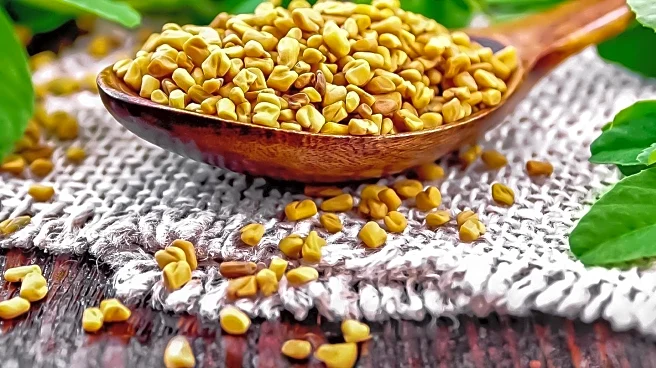What's Happening?
The Mankai plant, scientifically known as Wolffia globosa, is gaining attention for its potential health benefits, particularly in cognitive health. Native to Southeast Asia, this aquatic plant is rich
in protein, earning it the nickname 'vegetarian meatball.' Research suggests that Mankai may help prevent cognitive decline and conditions such as Alzheimer's disease. It is a staple in the 'green' Mediterranean diet, which emphasizes low carbohydrates and high healthy fats, supplemented with Mankai, walnuts, and green tea. The plant's benefits are attributed to its high polyphenol content, which offers antioxidant and anti-inflammatory properties. Mankai is also a complete protein source, containing all nine essential amino acids, and provides vitamin B12, which is crucial for DNA and red blood cell production. Additionally, it may aid in weight loss and managing type 2 diabetes, and offers cardiovascular benefits due to its omega-3 fatty acids.
Why It's Important?
The introduction of Mankai into diets could have significant implications for public health, particularly in the areas of cognitive health and nutrition. As a rich source of polyphenols, Mankai may offer a natural approach to reducing inflammation and improving memory, which is crucial in the prevention of neurodegenerative diseases. Its high protein content and essential nutrients make it a valuable food source for vegetarians and vegans, who often struggle to obtain sufficient vitamin B12. Furthermore, its potential role in weight management and diabetes control could contribute to broader health benefits, addressing common health issues in the U.S. The plant's sustainability, growing rapidly with minimal water, also presents an environmentally friendly food option.
What's Next?
As awareness of Mankai's benefits grows, it may become more integrated into dietary recommendations and health-focused food products. Researchers and health professionals might explore further studies to confirm its efficacy in cognitive health and other areas. The food industry could see an increase in demand for Mankai-based products, potentially leading to innovations in plant-based nutrition. Additionally, discussions around sustainable agriculture practices may highlight Mankai as a model for efficient crop production.
Beyond the Headlines
The rise of Mankai as a superfood could influence cultural dietary habits, encouraging a shift towards plant-based diets that prioritize sustainability and health. Ethical considerations regarding food sourcing and environmental impact may become more prominent as consumers seek foods that align with their values. The plant's ability to grow quickly and sustainably could inspire agricultural advancements, promoting food security in regions facing resource constraints.










